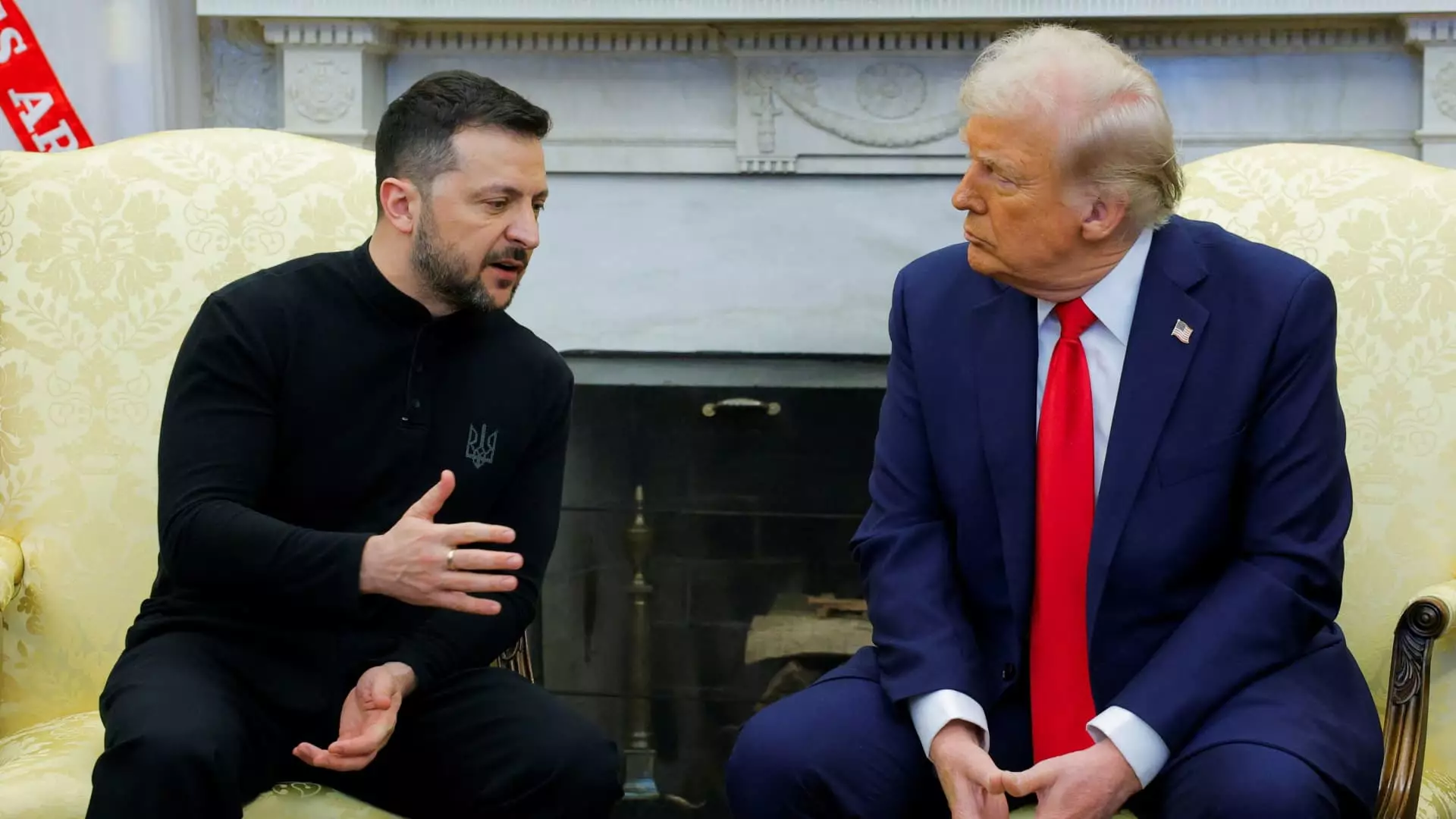In an evocative twist of fate, U.S. President Donald Trump and Ukrainian President Volodymyr Zelenskyy found themselves in the serene yet formidable surroundings of St. Peter’s Basilica in Rome. Their meeting, borne out of a combination of desperation and ambition, aimed to resurrect the faltering peace efforts concerning Russia’s relentless war in Ukraine. The setting itself, imbued with the solemnity of a Pope’s funeral, ironically served as a backdrop for a convergence in motives that resonate both illusory and vital. The hope that they kindled representing an almost naive desire for a historic resolution, reflects a cynical reality: diplomatic encounters often oscillate between genuine intent and political theater.
As they leaned in during their private chat—sans aides—Zelenskyy and Trump appeared to engage in an intimate exchange, signifying the personal stakes that such discussions entail. With a mere 15 minutes dedicated to dialogue, the weight of their ambitions strained against the frail fabric of time. “Good meeting,” Zelenskyy later proclaimed on social media, implying that whatever was articulated offers fertile ground for potential collusion. However, the question remains: can mere words in a hallowed setting shift the entrenched positions of two belligerent nations?
The Stakes of Ceasefire and Concessions
The topics discussed, including a complete ceasefire and the quest for lasting peace, reveal the essence of negotiation: vulnerability and power. The ongoing conflict has taken a staggering toll on Ukraine, yet the notion of a “reliable and lasting peace” often overlooks the nuances of realpolitik. For Trump, the proposition of legal recognition of Crimea as Russian territory—sought by Moscow and vehemently opposed by Kyiv—is a dealbreaker, exposing the gulf that still lies between their aspirations.
Zelenskyy’s response to the American stance showcases a precarious balance: while he professes a desire for collaboration, he stands firm against crossing red lines that might jeopardize Ukrainian sovereignty. In essence, this duality embodies the tension that has characterized their relationship: necessity tempered by deep-rooted mistrust. As Trump pushes for negotiations with both sides, the motives appear twofold: a desire for historical recognition and a pragmatic approach to political expediency.
Diverging Paths: The Strain of Personal Relations
The relationship between Trump and Zelenskyy is not merely political but also personal, mired in a history of accusations and insinuations. Their previous Oval Office meeting, fraught with Trump’s caustic remarks about Ukraine’s commitment to peace, has left lingering scars. Zelenskyy’s attempts to mend what has been broken are undercut by Trump’s tendency to view international relations through a lens of transactional power. While he must rely on Zelenskyy to legitimize his quest for peace, the interval remains rife with barbs and grievances, establishing an uncomfortable dynamic wherein cooperation teeters on the brink of suspicion.
Despite these intricacies, both leaders are, paradoxically, chained by their narratives of necessity. Zelenskyy desperately seeks international support against a relentless adversary, while Trump requires the credibility that only a successful diplomatic resolution can provide. If Zelenskyy appears too compliant, he risks alienating his domestic support; however, if Trump appears overly obstinate, the peace efforts could quickly dwindle into oblivion. Thus, they remain locked in this interplay of requirement—a political tango reflecting vulnerability amid the grandiosity of their respective offices.
The Role of Symbolism in Diplomacy
Amidst the body of political maneuvering, the symbolism of their face-to-face discussion in a venerable place, however fraught with danger, cannot be understated. The funeral of Pope Francis himself, a figure who championed peace and reconciliation, further complicates their interaction. It accentuates the role of morality and ethics in negotiations, as Zelenskyy chooses to embody the plight of his nation over sartorial expectations. His military-style jacket serves as a stark reminder of the ongoing struggles faced by the Ukrainian people—an outward representation of unity with his soldiers.
Cardinal Giovanni Battista Re’s poignant sermon asserted that “war always leaves the world worse than it was before,” which rings with an uncomfortable truth. As leaders congregate for photo-ops and performative gestures of diplomacy, the realities of conflict continue to devastate lives. The risk here is an almost moral fatigue that can engulf global leaders: the incessant back-and-forth narratives couched in high rhetoric but, in practice, seemingly fail to offer concrete solutions or long-term commitments.
With each encounter stripped down to its elemental truths, what emerges is not merely a meeting of two leaders, but rather a manifestation of the hopes and fears carried by their constituents. As the war rages on and the stakes escalate, the challenge lies not just in unifying fragmented dialogues, but in pressing upon each other a profound sense of accountability that transcends their personal conflicts. The heavy weight of history looms large and compellingly, posing a daunting challenge for both leaders to navigate the uncharted waters ahead.

Leave a Reply